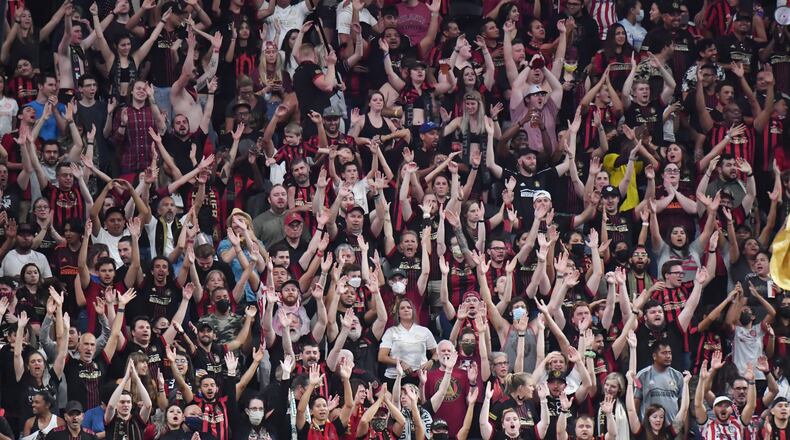It’s no longer an expansion team, though it never carried itself like an expansion team. Atlanta United knew it was a big deal before a ball had been kicked. It was owned by Arthur Blank, who co-founded Home Depot. It was run by Darren Eales, who apprenticed at Tottenham Hotspur, among the Premier League’s Big Six. It hired Tata Martino, who managed Barcelona and the Argentine national team.
On opening night, Atlanta United packed Bobby Dodd Stadium, which Georgia Tech has trouble doing. It soon moved to a permanent home – the new Mercedes-Benz Stadium – and began drawing crowds the likes of which the MLS hadn’t seen. From birth, the club was beloved by an Atlanta audience that differed from those following the Braves and Falcons and Hawks.
Atlanta United was new, but it also was good. Martino’s name had resonance in South America. Josef Martinez arrived from Venezuela, Miguel Almiron and Tito Villalba from Paraguay, Leandro Gonzalez Pirez and Yamil Asad from Argentina. In Year 1, Atlanta United ranked second in goals and made the playoffs. In Year 2, it led the league in scoring and won the MLS Cup, trailing only once over five playoff games.
Its attendance became a source of wonder. It was drawing NFL-sized crowds to an NFL-sized stadium. Of the top 10 regular-season gatherings in MLS annals, Atlanta United accounts for nine. Of the top five throngs in MLS Cup history, it accounts for four. The club has ranked first in attendance every season except 2020, the COVID-19 year.
The team, alas, has seen diminishing returns. Martino left after the MLS Cup to coach Mexico. Almiron signed with Newcastle of the Premier League. Their replacements were Frank de Boer, a Dutchman whose coaching career was notable for abrupt firings with Inter Milan and Crystal Palace, and midfielder Pity Martinez, who’d led River Plate of Buenos Aires to a famous Copa Libertadores title over rival Boca Juniors. They arrived in early 2019. By September 2020, both were gone.
The de Boer hire wasn’t quite a disaster – if not for a shootout loss in a home semifinal against Toronto, Atlanta United would have played host to the 2019 MLS Cup final – but his 55 games in charge saw the club take its first backward steps. Under interim coach Stephen Glass, it missed the 2020 playoffs. Gabriel Heinze, a former Argentine national teamer, lasted 17 games in 2021, his relationship with Martinez, who was returning from a torn ACL, having frayed in record time.
For reasons unclear, Heinze had Martinez train away from the rest of the team. The coach was gone by July. Under Gonzalo Pineda, Atlanta United managed to finish fifth in the East but was gone after Round 1. Pineda’s first full season saw Martinez suspended for “bad behavior” and the team finished 11th in the East. Claiming 2022 playoff spots were Cincinnati and Inter Miami, teams that came into being after Atlanta United was the swaggering new kid on the block.
Eales exited last summer, also bound for Newcastle. His replacement is Garth Lagerwey, who built the Seattle Sounders into an MLS colossus and who seems the best hire Atlanta United has made since Martino. The other franchise pillar departed in January, Martinez signing with Inter Miami.
Though it was past time for him to leave, his absence will be felt. He scored 111 goals. If you add the totals of the club’s next six leading scorers, you get 108. He was the 2018 MLS MVP. He was among this city’s biggest stars.
It will be fascinating to see where Atlanta United goes from here. The club has a massive fan base, which is great, but ardent fans demand results. Atlanta United hasn’t won a playoff game since Oct. 24, 2019. It has missed the postseason two of the past three years. Its guiding light has gone back across the pond. It’s on its third manager since Martino. Under Pineda, it has won 19 of 52 games.
To say Atlanta United hit the ground running is to understate. It was moving so fast when it began playing that its cleats barely touched the turf. A flying start soon became a championship. Atlanta United’s attendance reset the record book on a weekly basis. The club became the MLS model. “Here,” the league said to its other franchises, “is how it’s done.” And so it was – for a while.
To say Atlanta United might never have another run like its first misses the point. No MLS team has ever been so good so fast. What Atlanta United must show is a sustainable plan to win games. Drawing a crowd is great. Sending the crowd home happy is even better.
About the Author
The Latest
Featured



